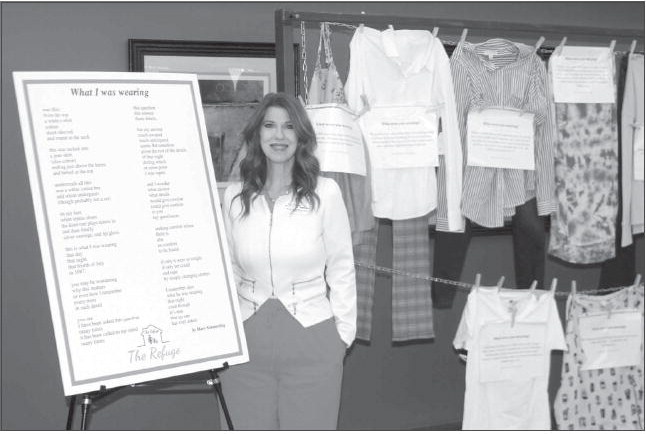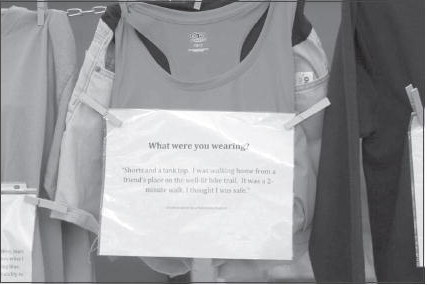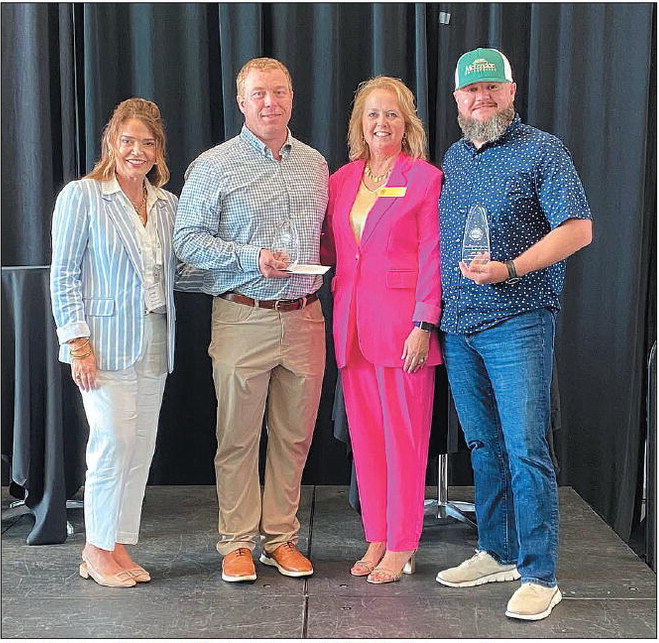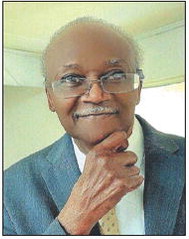“Denim Day” Promotes End of Sexual Assaults


mrandolphadvance@gmail.com
As a part of the recognition of Sexual Assault Awareness Month, The Refuge Sexual Assault Center Coordinator Heather Williams addressed students on Thursday, April 20, to share information on both “Denim Day” and the resources that the Center offers.
“Denim Day” is a day of awareness sponsored by the Jeans 4 Justice nonprofit organization which promotes the end of sexual assaults. Each year, individuals are encouraged to wear blue jeans to show their support for those who have been sexually assaulted.
“Denim Day was born in the 1990’s, and it came from the Italian Supreme Court,” Williams remarked. “A man who was found guilty of the rape of an 18-year-old appealed his case and said he should not have been convicted because the victim was wearing jeans. The court said, ‘Oh yes, we agree, because certainly everybody knows if you’re wearing jeans, jeans are typically tight – someone cannot take them off of you. So, you must’ve helped take your jeans off, and when you helped take your jeans off, that would have been giving consent.’ Therefore, his conviction was overturned and he was released.”
According to Williams, this decision was not popular among the females who worked in the court and government. “In an act of solidarity, a lot of the women in the court and legal system all wore jeans the next day to say, ‘No, what I am wearing does not give consent. Ever. No matter how tight or how small, it does not give consent,’” she emphasized.
Thus, “Denim Day” became an international day of awareness and advocacy. This year, the day was celebrated on April 26. About the Sexual Assault Center Origin
The Refuge Sexual Assault Center opened in 2018 after The Refuge Domestic Violence Shelter was contacted by the Criminal Justice Coordinating Council in Atlanta and asked to create a central facility for victims to receive treatments and exams.
“They contacted us and said, ‘Hey. We’ve been having a lot of sexual assaults in your five-county area that the shelter covers. If we give you the money and support, would you open a sexual assault center? It’s not fair or right for sexual assault victims from our area to have to go elsewhere to get their exams, treatment, and care,’” Williams explained.
She said that prior to the Center opening in Vidalia, sexual assault victims would have to go to Dublin, Statesboro, and other areas to receive this care. “After you’ve experienced something like this, it is a big ask and barrier to ask people to make that trip,” she added.
The Center is located on Jackson Street in Vidalia and funded through the Criminal Justice Coordinating Council and the United Way of Toombs, Montgomery, and Wheeler Counties. “We are across from the new [Dr. Mark and Tonya Spivey Public] library and beside Mimosa [Gift Boutique]. We want people to know where we are,” Williams emphasized. “I’ve had victims knock on our door and say, ‘I think I need to talk to somebody.’” Though services are available at the Center at all times, the actual facility is only manned on Monday through Friday, from 8 a.m. until 4 p.m. “You may think that this is not something we need in this area, but it is,” she added. “We had our first full physical exam performed in February 2019, and we’ve been at it ever since.”
SANEs
Exams are completed at the Center by SANEs, or Sexual Assault Nurse Examiners. In Georgia, SANEs are required to be registered nurses (RNs).
“Typically, before we came, these types of exams were done in the hospital in the emergency room,” Williams said. “If we had someone who stated to the Emergency Department [of the hospital] that they had been a victim of a rape or a sexual assault, the staff there would perform the exam.”
Often, this practice would create issues, according to Williams. The hospital staff – through no fault of their own – were not trained on how to handle these cases. “I have been a nurse for almost 27 years, and I was never trained on handling these situations until I became a SANE,” she stressed.
The care given by a SANE is very different than the care given in the hospital. “It is very personalized,” Williams shared. “We have contracts with all the hospitals in our service areas to actually do those exams for them and to help take that off of them. Our exams can be anywhere from two to over five hours – that’s not really something that needs to be done in the emergency room. And if you’re a victim, you don’t want to be in the emergency room for that. Our Center is nice, it’s comfortable, and it’s one-on-one so we are really able to give them that individualized care that they need after these events.”
Men and women, ages 12 and older, are served at the Center. If a victim is below age 12, the Center works with the local Child Advocacy Center to get the victim to them to receive care.
“The first thing I am concerned about is the health and safety of the victim,” she emphasized. “Are they OK? Were they injured? Do they have an injury that needs to be accessed by the emergency room? If so, we are going to get them there first – this trumps any type of evidence collection that we would do at our Center.” Why SANEs Are Important
SANEs are not only able to collect important medical evidence of these assaults, but are also trained to help victims feel as comfortable as possible during the process.
In her seminar, Williams shared a nationallyreported story from a sexual assault victim who said that the emergency room nurse’s lack of training on completing a forensic medical exam made her very uncomfortable. “He was fumbling around and he was very, very nervous. He did a pelvic exam and kept saying, ‘I’m sorry I have to do this…I’m sorry.’ I felt like I had to comfort him and make him feel OK. This guy was supposed to be helping me, but he didn’t know what he was doing,” the narrative read.
“Unfortunately, we hear this a lot in communities that don’t have programs like we have here, and that is why we feel that it is so critically important to get these victims to us so we can provide that very specialized care that they need at that moment because no victim should have to go through something like that,” Williams commented.
The Role of SANEs
SANEs work in a variety of fields surrounding sexual assaults, which include domestic violence, child abuse and neglect, elder maltreatment, death investigations, and corrections facilities. Currently, at the Center, SANEs focus on sexual assaults, elder maltreatment, and domestic violence.
According to Williams, many of the SANEs at the facility have received extensive training specifically on strangulation, as the act often occurs in domestic violence and sexual assault cases. “We noticed when we first started and were training and learning in this area that unfortunately, strangulations are extremely common in domestic violence, and we do see them in sexual assaults,” she said. “We branched out a bit and we got more training and more education on strangulation. I am a forensic nurse, and based on that, I can treat other types of victims. So, we really focused in on strangulations because it is life-threatening.”
Strangulations may have fatal results for victims without showing any sign of damage or harm. “It could be months down the road [that] you now have victims having a stroke or that have a clot that travels to the brain – if it’s severe, they can die,” she stressed. “So, we really wanted to focus on these people who needed help and who needed to be seen by a nurse who really knows about these things.”
Williams added, “And as a bonus, we can take pictures and collect evidence that can help law enforcement to really aid their investigation because, unfortunately, sometimes without proof or evidence it becomes a ‘he said, she said’ kind of situation, and law enforcement isn’t able to do what they need to do to protect victims and get the bad guys off the streets.
“But since we started doing these exams, we have been able to assist law enforcement. [We have been able] to take a case that appears at first glance like someone may be charged with a misdemeanor, but after coming and seeing me, letting me do an exam, taking photos, and talking to the victim, the case becomes a felony aggravated assault charge because of the evidence.”
Because of collecting this evidence, SANEs may often be used in the courtroom during cases as expert witnesses. These specialized nurses may educate the judge and jury on the commonalities of sexual assault, as well as speaking to specifics on cases which they have covered.
The Exam
The exam after a sexual assault is completed by a SANE and may be very lengthy depending on the amount of bodily injury and mental state of the victim. “Sometimes, we have people who have received more injuries than others, and sometimes, we may have victims who have to take breaks throughout the exam,” Williams remarked.
She said that exams are “head to toe,” as SANEs look for any and all harm done to the body of a victim. These injuries may be documented through swabs, photos, and other pieces of evidence. Typically, all evidence should be collected within 120 hours of the assault.
These “head to toe” exams are imperative to each case, according to Williams, as not all injuries may be easily visible. Sometimes violent, sexual assaults may show very little evidence due to the neurobiology of the victim, the victim’s anatomical structure, and/or age.
When conducting the exam, SANEs will ask for consent before completing each step of the exam; at any point, victims may stop the exam and decide not to go any further.
“These exams cannot determine if consent was given,” Williams emphasized. “If law enforcement asks me if consent was given, I cannot answer, but I can show them evidence that helps to reconstruct the event.”
Jane/John Doe Cases
Evidence may also be collected from sexual assault victims who do not wish to file charges. In these cases, which are commonly known as “John Doe or Jane Doe” cases, SANEs complete an exam of the individual and file all evidence under a number rather than a name.
The evidence will remain on file for at least a year, in which the victim may decide to press charges at any time. During this time, an advocate from the Center will remain in contact with the victim and will counsel them through the experience.
More Information
For more information on The Refuge Domestic Violence Shelter, The Refuge Sexual Assault Center, or SANEs, contact Williams at 229-300-0955.

CLOTHING OR CONSENT? – During Sexual Assault Awareness Month, The Refuge Sexual Assault Center placed a display of clothing which victims said they were wearing during sexual assaults to emphasize that clothing does not provide consent.Photo by Makaylee Randolph





